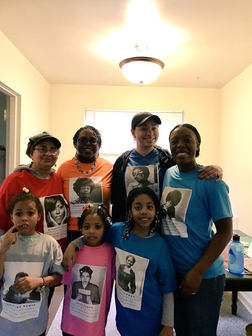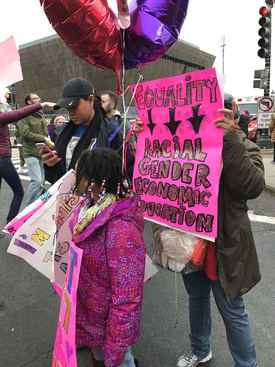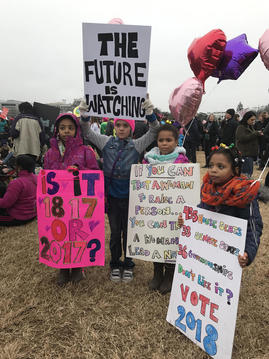 Each of us made shirts for our Black woman spirit animal. Each of us made shirts for our Black woman spirit animal. I woke up on the morning of the one year anniversary of the Women’s March on Washington with the expectation that my social media feed would be flooded with a stream of love, joy, and togetherness. Instead I saw a flood of negativity by women who live in the intersections. People talked about how they hadn’t heard about the march; how Pussy-Hats were symbols of white supremacy; or how they generally felt the March was not inclusive to women of color or trans women. I get it. White women’s movements have been historically isolating and unkind to those of us living in the margins and the footnotes of American history. That said, I wanted this movement to be different. And for me, it was. Last year my mother, myself, and my daughters were featured in the New York Times which included an interview and a NYT video. Our experience captured the essence of who we are as a family and what we stand for as multigenerational women searching for solutions to tough questions that represent our lives. This year I couldn’t attend because of severe sickness and the flu bug that hit our family hard this year. The excitement to fulfill my FOMO was vanquished by the many opportunities people took to bash the March. I wondered why. Was it because the March wasn’t solely focused on police brutality or trans women’s issues? Were pink hats too much? What made a movement with founders representing many communities feel so out of touch for these people complaining? Then I wondered if I was out of touch with black issues and the issues that affect black women.  Equality: Racial, Gender, Economic, Education Equality: Racial, Gender, Economic, Education I’ve always known I was a black woman all my life. I’ve never wanted to be anything else. In fact, my sense of blackness runs deeper than “wanting to see more representation of brown skinned women in media”. As a child of a Delta and a grandchild of an Omega man, I grew up in the richness of black tradition. I grew up watching Eyes on the Prize videos and marching on MLK Day. I remember I was called an “Oreo” (black on the outside, white on the inside) by a black middle school classmate who had no idea who Mansa Musa, Crispus Attucks, or Phillis Wheatley were. Being able to trace my roots almost to “the wall” (the person from Africa brought into slavery in America); I grew up “woke” and confident that black skin was not a barrier to entry or an inferior card in the game of life. The black experience was a full and rich struggle that provided each generation one more hopeful step toward the American promise of equality. So for me, the Women’s March and movement was an opportunity to stand up against an administration built upon spreading negativity and broad generalizations. And though I did not don a pussy-hat because many black women had contributed their bodies to the science of female reproductive experimentation. My sheer presence at the March was my “snarky” sign. My life itself and the continued fight for a quality experience, was a protest.
2018 is not a time for anger. It’s a time for action. It’s a time for those of us living our lives in this double standard of citizenship to yell, not grumble, until someone hears us. And if no one hears you, come to the table with your own solutions to the issues that affect your race, your class, your gender, your sexuality.
I’ve been “woke” my whole life... And if your just waking up, welcome to the team! It’s time to get out of the bed and go do something amazing.
0 Comments
Your comment will be posted after it is approved.
Leave a Reply. |
I'm a former teacher and former college athlete, currently working to make life more equitable for all people. My mission is to get parents to partner with their child's teacher.
|

